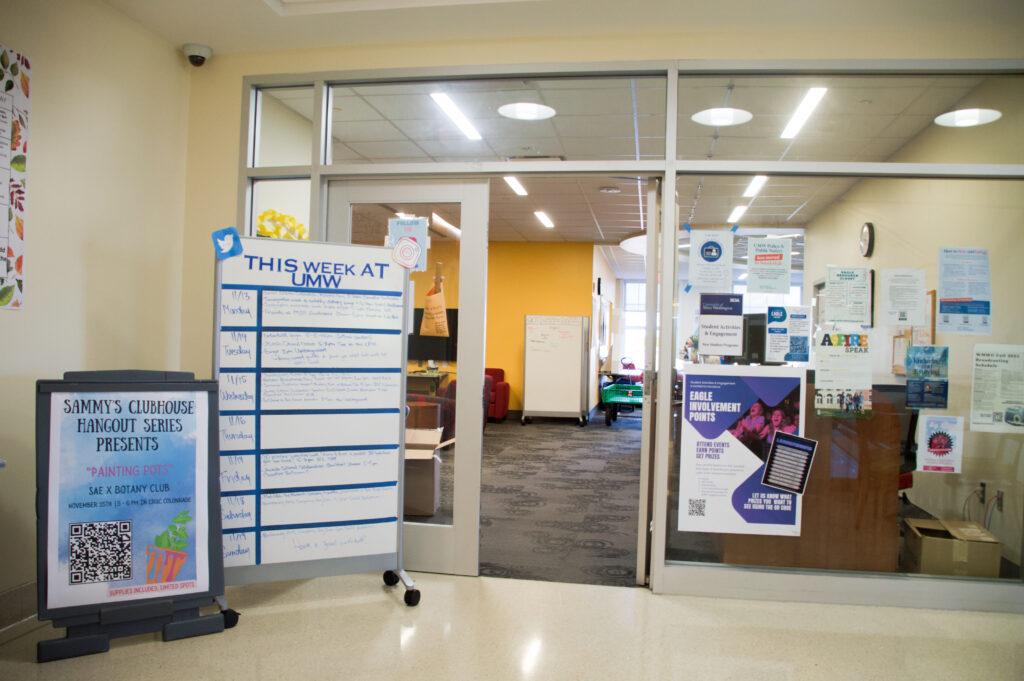SGA launches Eagle Concerns to give students a voice on University matters
3 min read
SGA offices are located inside of Student Activities & Engagement. | Abbey Magnet, The Weekly Ringer
by KY HUYNH
News Editor
On Nov. 2, in an effort to facilitate communication between students and administrators, the UMW Student Government Association launched Eagle Concerns, an online form for students to voice their concerns and comments regarding university matters. With this new initiative, students are able to raise concerns directly with SGA whose members then bring it to administrators.
“This is for students, by students. The faculty have their own way to get their concerns to their respective places,” said Jaylyn Long, a senior biomedical science major and president of SGA. “And so this is a respective place for students to get their concerns to SGA, which we then bring to administration.”
The form can be completed anonymously, or students can share their name and email if they would like a follow-up. The submissions are processed using different assessments depending on the concern.
“The process may take a little different paths, depending on what it is like if it’s something with campus PD [Police Department], we can easily [say] ‘Hey, Chief Hall, this is a concern that students have had,’” said Long.
After receiving submissions via the form, the SGA Senate screens responses and assesses them in terms of what’s feasible and who they can reach out to. These concerns are then delegated to one of SGA’s five committees.
SGA’s five committees are: academic affairs; university and community relations; diversity and unity coordinating; elections, appointments, ethics and oversight; and student life and engagement. Once the concern is assigned to a specific committee, members research the matter before reaching out to administrators.
“We try to check it weekly at our meetings,” said Long. “Senate screens it and push it out to committees.”
In the past, SGA has held different in-person events for students to express their concerns. Despite this, they felt that hosting events such as tablings were not the most efficient ways to receive concerns.
“I wanted a more consistent way for us to do concerns without students having to feel nerve racking about coming to an SGA meeting to get their concerns out, or like chasing down a senator to get their concerns out to an SGA member,” said Long.
There are flyers advertising Eagle Concerns posted around campus with a QR code that links to the form. In addition to physical copies, Eagle Concern information can be found on digital bulletin boards in locations such as the Hurley Convergence Center, Woodard Hall, James Farmer Hall and the University Center. A link to the form is also located on SGA’s Instagram page. In the future, students will be able to access the form via SGA’s website, which is under development.
“We’re just currently working on more ways to get it out to students,” said Long.
Prior to Eagle Concerns, the University already provided a formal way for students to report concerns via the UMW Concern Report. The processing of these reports is similar to that of Eagle Concerns, but the University’s form serves as an incident report, while SGA’s allows students to be more broad.
The Concern Report requires information regarding the date, location and nature of the incident. However, through Eagle Concerns, students are able to submit responses without having to include specific details.
“If students prefer to submit their concerns through the SGA, that is yet another good avenue for student government and administration to understand what students need and their concerns,” said Juliette Landphair, vice president for student affairs.
As Eagle Concerns is meant to be a streamlined form of communication for all students, it can be particularly helpful for first-year or transfer students who may be unfamiliar or intimidated by more formal resources such as the Concern Report.
“For any specific major it can be complicated and even scary at times to reach out to someone when you don’t know who that person to reach out to is,” said Allen Queen, a sophomore international affairs major.
“I definitely see this new resource as something important for the entire student community here on campus because we now have the ability to easily connect to our representatives.”











